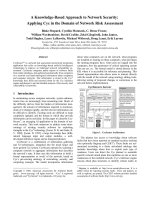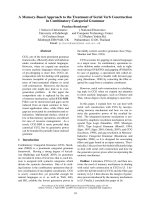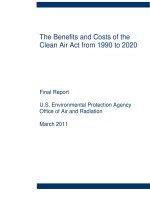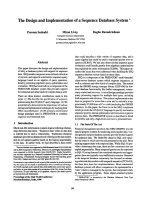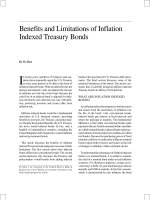The benefits and limitations of a genre - based approach to teaching writing to grade 10 students in Tan Trao high schoool, Tuyen Quang province
Bạn đang xem bản rút gọn của tài liệu. Xem và tải ngay bản đầy đủ của tài liệu tại đây (159.13 KB, 9 trang )
The benefits and limitations of a genre - based
approach to teaching writing to grade 10
students in Tan Trao high schoool,
Tuyen Quang province
Những lợi ích và hạn chế của đường hướng
dựa vào thể loại đối với việc dạy viết cho học
sinh lớp 10 trường THPT Tân trào,
Tuyên Quang
Bùi Thị Thu Huyền
University of Languages and International Studies
M.A. Thesis. English Teaching Methodology; Mã số: 60 14 10
Supervisor : M.Ed. Khoa Anh Việt
Năm bảo vệ: 2012
Abstract. There are two main purposes of the study. One main purpose was to
investigate how the benefits and limitations of using a genre-based approach to
teaching writing for grade 10 students are. The second main purpose was to explore
their attitudes towards learning to write with this approach. The genre chosen for this
study is narrative text. A pre-test-posttest group research design was used .The sample
population was from two classes of the grade 10 students at Tan Trao High school.
There were totally 90 students involved in this study (30 male and 60 female). The
experimental group was taught using a genre-based approach for 5 weeks following
four stages: Building knowledge of the field, modeling of the text, Join Construction
of the Text, Independent construction of the Text. The control group was taught in the
traditional method of the teacher-centered approach. This study collected data from
two writing tests, motivational questionnaires, and observation. The statistical tools of
the Independent sample Test were used to determine whether there were significant
inter-group differences. The results of the study showed that the experimental group
outperformed the control group significantly. The major findings of this study
suggested that the genre-based approach helped significantly to enhance the students’
writing skills and their motivation towards learning writing. Based up the conclusions
drawn from the study, the genre-based approach was thus recommended to be
integrated into teaching writing for the students at Tan Trao High School in Tuyen
Quang province. Finally, suggestions for further research were recommended.
Keywords. Tiếng Anh; Kỹ năng viết; Lớp 10; Phương pháp giảng dạy
Content.
TABLE OF CONTENTS
CONTENTS
PAGE
Acknowledgements
i
Abstract
ii
Table of contents
iii,iv,v,vi
Lists of abbreviations
vii
Lists of tables and figers
viii
INTRODUCTION
1. Rationale
1
2. Purposes of the Study
1-2
3. Research Questions
2
4. Scope of the Study
2
5. Research Method
2
6. Design of the Study
2-3
7. Summary
3
DEVELOPMENT
CHAPTER 1.LITERATURE REVIEW
1.1. Theoretical Backgrounds of Writing
3
3
1.1.1. Definitions
3-4
1.1.2. Role of writing skill in Foreign Language Learning
4-5
1.2. Theoretical Backgrounds of Genre-Based Approach (G.B.A)
6
1.2.1. Why choose a genre based approach to teaching writing ?
6-7
1.2.2. Definitions
7-8
1.2.3. Genre-Based Approach (G.B.A)
8
1.2.4 Basic Principles of G.B.A
8-9-10
1.2.5. The curriculum cycle of G.B.A
10-11
1.2.5.1. Building knowledge of the field
11-12
1.2.5.2 .Modeling of the Text
12
1.2.5.3. Join Construction of the Text
13-14
1.2.5.4. Independent construction of the Text
14-15-16-17
1.3. Theoretical backgrounds of narrative text
17-18
1.4. Benefits and limitations of GBA
19-20-21
1.4.1. Benefits of GBA
19-20
1.4.2. Limitations of GBA
20
1.5. Conclusion
21
CHAPTER 2.THE STUDY
2.1. The setting of the study
21
21
2.1.1. The context
21
2.1.2. The writing program of the grade 10 students
21
2.1.3. The participants
22
2.2. The Experimental program
23
2.2.1. Materials
23
2.2.2. Activities
23
2.2.3. Role of the teacher and the students
23-24
2.3. Data collection
24
2.3.1. Data collection Instruments
24
2.3.1.1. Pre-test and Post-test
24
2.3.1.2. Pre- and –Post Questionnaires
24
2.3.1.3. Teacher’s and students’ observation
25
2.3.2. Data collection Procedures
25
2.3.2.1.Before the experimental treatment
25
2.3.2.2.During the experimental treatment
25
2.3.2.3.After the experimental treatment
25-26
2.4. Data Analysis
26
2.4.1. Data Analysis of Pre -and - Post Tests
26
2.4.1.1. The two groups’ writing performance before the experiment
26-27
2.4.1.2. The two groups’ writing performance after the experiment
27-28
2.4.1.3. The experimental groups’ improvement in writing proficiency
29-30
2.4.2. Data Analysis of Questionnaires
30
2.4.2.1. Students’ attitude to writing before and after the experiment
30-31-32-33
2.4.2.2. Students’ participation before and after the program.
33-34-35
2.5. Summary
35
CHAPTER 3.DICUSSION THE RESEARCH QUESTIONS
35
3.1. Discussion of the Research Questions
35
3.1.1. Benefits of G.B.A on students’ writing proficiency
35-36-37
3.1.2. Limitations of G.B.A to teaching writing
37-38
3.2. Summary
38-39
CONCLUSION
39
1.The benefits and limitations of the genre-based approach in teaching
writing to my own students.
39-40
2.Limitations of the study
40
3.Implications for further research
40-41
References
I, II, III
Appendix 1: Sore writing , rating scale
IV, V, VI
Appendix 2: Pre-questionnaire
VII, VIII
Appendix 3:Post-questionnaire
IX, X
Appendix 4: Lesson Plan
XI,XII,XIII,
XIV,XV
References.
Tiếng Việt
1.Tài liệu Nghiên cứu ứng dụng sư phạm ứng dụng-Dự án Việt-Bỉ
2.Nguyễn Thị Thúy (2000), Một số khó khăn trong việc dạy kỹ năng viết theo sách
giáo khoa mới tiếng anh 10 (cơ bản) trên thực tiễn của giáo viên và học sinh lớp 10 tại
trường THPT Kinh Môn ,Hải Dương, Luận văn Thạc sỹ, trường Đại học Ngoại ngữ,
Đại học Quốc gia Hà Nội, Hà Nội.
Tiếng Anh
1. Anderson, K. & Anderson, M. (1995). Text Types in English. Australia:
Macmillan Education.
2. Badger, R. and White, G. (2000). A process genre approach to teaching writing.
ELT Journal Volume 54/2. Oxford: Oxford University Press.
3. Bruce, I. (2008). Academic Writing and Genre. London: Continuum.
4. Byrne, D.(1988) Teaching writing Skills.London: Longman
5. Canh, LV. (2004).Understanding Foreign Language TeachingMethodolody.
Hanoi: Hanoi national university Publishing House
6. Callaghan,M.,&Rotherry,J .(1988) Teaching factural writing: A genre based
approach.Marrickville,N.S.W:DSP literacy project,Metropolitan East region.
7. Chandrasegaran, A and Kum, K. T. (2008). Teaching Expository Writing.
Singapore: McGraw-Hill Education.
8. Cope, B., & Kalantizis,M. (Eds) (1993).The powers of literacy: A genre approach to
teaching writing. London: Falmer Press
9. Freedman, A., & Medways, P (1994) ‘’Do as I say’’: The relationship between
teaching and learning new genres. In A. Freedman (Ed), Genre and the new rhetoric.
London: Taylor & Francis
10. Gorlach, M. (2004). Text Types and the History of English,[online]. Available:
books.google.com. sg/books?isbn=3110132168
11. Greetham, B. (2001). How to Write Better Essays. New York: Palgrave
12. Hyland, K. (2003).Genre-based pedagogies: A social response to process. Journal
of second Language Writing, 12(1),17-29.
13. Heaton, J.B.(1988).Writing English Language Tests. New York:Longman
14. Jordan-Henley, J.(1988). A Brief Guide to Writing Narrative Essays [online].
Available: www.roanestate.edu /owl &writing center / / narration.html
15. Kay, H.,& Dudley-Evans, T.(1998).Genre: What teachers think? ELT Journal,52(4
),303-313.
16. Leki, I (1998). Academic Writing: Exploring Processes and Strategies.
Cambridge: Cambridge University Press. Narrative writing definition,
(online).Available:
www.units.muohio.edu/technologyandhumanities/nardef.htm
17. Nunan, D.(1995).Language Teaching Methodlody.A textbook for Teachers.New
York: PhoenixELT
18. Nunan, D.(2001). Reseach methods in language teaching.Cambridge:CUP
19. Nation, I.S.P. (2009).Teaching ESL/ EFL Reading and Writing. New York:
Routledge.
.20. Narith, K. C. (2000). Teaching narrative writing at the Royal University of
Phnom Penh. RELC Regional Language Centre.
21. Paltridge, B. (1996) .Genre , text type, and the language learning classroom. ELT
Journal.
22. Paltridge, B. (2001) .Genre and the language learning classroom. Ann Arbor:
University of Michigan Press
23. Paltridge, B. (2007) .Approaches to Genre in ELT. In J. Cummins & C. Davison
(Eds), International handbook of English language Teaching, Vol 15,springer US.
24. Swale, F. (1990). Genre Analysis. Cambridge: Cambridge University Press.
Tribble,C.(19960.Writing.Oxford: Oxford University Press.
25. Wendy, B. and Ostrom, H. (1997). Genre and Writing. Portsmouth: Boynton/Cook
Publishers.
26. Website:




